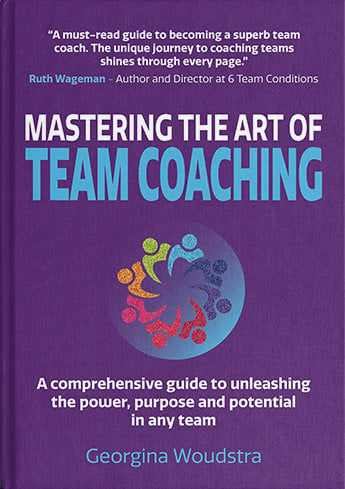What exactly is the difference between team coaching and team facilitation? Both involve working towards shared goals. Both help the team move forward. Facilitation tends to focus on the team’s task, managing the process to free up the team to think fully and deeply about the task together. Team managers can be in a good place to facilitate team activities unless they need to be involved in the thinking, at which point many find it useful to have someone else facilitate the team.
Conversely, team coaching tends to focus on the team, helping to think fully and deeply about how they work together: such as their shared awareness, connection, habits and beliefs. For the work on the team to effectively take place, the team needs to have a shared purpose, coherent team processes, supportive stakeholders, and an established set of team members with the right capabilities to achieve the purpose. How many teams do you know that are fully on top of all these? Well, if you find yourself saying yes, then maybe team coaching can help this team to up their game.
If you’re not quite at this stage, there might be ground work to do before team coaching can start in earnest. Some team coaching assignments start out looking a bit like team facilitation. Similar tools and exercises address one or more of the missing, or below par, elements. Maybe the team needs to map out disruptive stakeholders, or create a shared action plan to meet its purpose. Great, there’s a collection of well established tools to help with these tasks.
One difference between the role of a team coach and that of a facilitator emerges in how they help the team to handle how its working on the tasks. the facilitator helps the team to capture what is being said. The coach is listening to what is not being said: what is avoided, the shared blind spots, withdrawal and avoidance behaviours, gaps in people’s awareness of each other, what is said but not heard. These spaces between people offer golden insights into the team’s functioning, especially for teams that are already performing quite well. It is here that trust and safety are built or lost. Our unconscious assumptions fill these spaces, creating interference, misdirection, miscommunication, and result in a drop in trust, performance, motivation, quality.
A second difference between team coach and facilitator is that the latter manages the process on behalf of the team whilst the coach ensures the team owns the process. As observed by Georgina Woudstra in her book Mastering the Art of Team Coaching, “Agreeing a vision or making a decision are incredibly useful outcomes for a team; however, if they use a facilitator whenever they need to make a decision as a team, they are not learning how to manage themselves more effectively”. The team coach helps the team to build their capability to work as a team.
A third difference between a team coach and facilitator is that the latter works with the team to achieve a specified outcome. Conversely a team coach will not have a set agenda for the team. They work with the team’s agenda picking up on what is happening as the team go about their work.
So is team coaching just fancy facilitation? We say not based on the outcomes you can expect from each. If you need to get a task done quickly as a team, a facilitator is your friend. If you need the team to unpick unhealthy habits, improve its ability to address conflict and decide for itself how its going to organise itself, treat yourself to a team coach.



